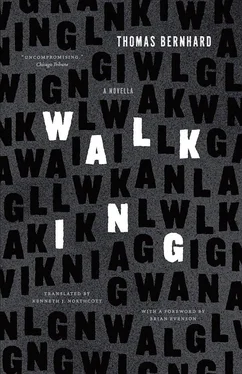Thomas Bernhard
Walking: A Novella
“The feeling grows that Thomas Bernhard is now the most original, concentrated novelist writing in German,” wrote George Steiner while the Austrian writer Thomas Bernhard was still alive. Now, more than two decades after his death, it has become increasingly clear that Bernhard was one of the strongest voices of twentieth-century European fiction, on an equal standing with writers such as Franz Kafka, Samuel Beckett, and Robert Musil. Possessed of an eccentric syntax and an incomparably rhythmical prose style, Bernhard’s best-known works function as irony-ridden monologues and screeds against his native Austria. They submerge readers deep within a maddened or evasive or sophistic voice and hold them there, not allowing them to come to the textual surface for air. Bernhard’s sense of these voices is impeccable and unrelenting. Their habitual patterns of expression are so strong that to read Bernhard is to feel as if you have been possessed, as if the thoughts of others are worming their way into your skull and changing the way you parse and categorize the world. As the sentences stack up and logic begins a relentless and darkly comic spin, you are in danger of being crowded out of your own head. This is a dilemma shared by Bernhard’s characters as well: “Since my thinking had actually been Roithamer’s thinking, during all that time I had simply not been in existence, I’d been nothing, extinguished by Roithamer’s thinking.”
Walking offers a vision of a relatively early Bernhard. Of an artist whose major concerns — suicide, life as disease, the collapse of identity, the rottenness of Austria, the looming presence of death and madness — are already established, but whose style is still in the process of taking its final form. It has many of the satisfactions of Bernhard’s later prose while at the same time suggesting other directions that Bernhard might have traveled.
Walking is a seminal work. It feels condensed and at times gnarled, as if Bernhard were trying to cram the thematic concerns of a longer novel into the smaller confines of the novella. In it, the narrator and his friend Oehler walk, discussing anything that comes to mind, but always circling back to their friend Karrer, who has recently gone irrevocably mad. The novella is a meditation on thinking — or, rather, on the impossibility of truly thinking. The majority of the narrative consists of Oehler talking and the narrator listening, sometimes responding. But Oehler’s speech quotes Karrer and others, making the layering of the narrative both maddening and wonderfully complex. Four years later, after Bernhard loosened this structure slightly, covering similar themes but allowing them to develop over four times as many pages and with a more substantial narrative in play, he would produce his finest and most disturbing work, Correction.
Like many of Bernhard’s works, Walking is unparagraphed. The structure is tripartite. The middle section recounts the events leading to Karrer’s definitive breakdown. One is tempted to view this tripartite structure in Hegelian terms — as thesis, antithesis, synthesis — but if Bernhard employs such a model, it is fissured and cracked and ironized at the outset: the ideas of the sections bleed together and any synthesis is ultimately thwarted. The first and third sections in the novella are sufficiently similar that they might also be read as a single section split in halves by a trauma rising through it. It is perhaps analogous to Hegel’s notion of the night of the world — the bloody head rising out of flux only to be swallowed up again — but twisted free of its philosophical significance and ultimate comforting contextualization: an eruption of a negativity through another negativity. In any case, Bernhard would not remain comfortable with the triad as a structural device (though he would use character triads); his later work moves away from structural triads toward dyads and monads, with longer works such as Extinction and Correction breaking into two long paragraphs, and shorter novels such as Concrete and Wittgenstein’s Nephew consisting of a single sustained burst.
At the heart of the story lies madness. Karrer’s “own daily discipline had been to school himself more and more in the most exciting, most tremendous, and most epoch-making thoughts with an ever greater determination, but only to the furthest possible point before absolute madness,” but the difficulty is that “at any moment we can think too far.” Thinking, in Walking , is like walking, and the characters think their ways along routes, with these routes leading sometimes over smooth ground and sometimes to the edge of an abyss. Suggests Oehler, “It is absolutely right to say, let’s enter this thought, just as if we were to say, let’s enter this haunted house.” Indeed, language is viral, infecting through the ear the mind that takes it in: external words rewire internal thoughts. By entering into the thoughts of others we become possessed by their thoughts, potentially annihilating ourselves.
Walking is successful in its own terms even as it prepares for Bernhard’s later novels, enriching and complicating our sense of one of the twentieth century’s greatest writers.
Brian Evenson
Walking. Translated by Kenneth J. Northcott
There is a constant tussle between all the possibilities of human thought and between all the possibilities of a human mind’s sensitivity and between all the possibilities of a human character.
This translation of Walking first appeared in Conjunctions , vol. 32 (1999). I should like to acknowledge with gratitude the help and encouragement that I received from Brad Morrow, the editor of Conjunctions . — KJN
Whereas, before Karrer went mad, I used to go walking with Oehler only on Wednesday, now I go walking — now that Karrer has gone mad — with Oehler on Monday as well. Because Karrer used to go walking with me on Monday, you go walking with me on Monday as well, now that Karrer no longer goes walking with me on Monday, says Oehler, after Karrer had gone mad and had immediately gone into Steinhof. And without hesitation I said to Oehler, good, let’s go walking on Monday as well. Whereas on Wednesday we always walk in one direction (in the eastern one), on Monday we go walking in the western direction, strikingly enough we walk far more quickly on Monday than on Wednesday, probably, I think, Oehler always walked more quickly with Karrer than he did with me, because on Wednesday he walks much more slowly and on Monday much more quickly. You see, says Oehler, it’s a habit of mine to walk more quickly on Monday and more slowly on Wednesday because I always walked more quickly with Karrer (that is on Monday) than I did with you (on Wednesday). Because, after Karrer went mad, you now go walking with me not only on Wednesday but also on Monday, there is no need for me to alter my habit of going walking on Monday and on Wednesday, says Oehler, of course, because you go walking with me on Wednesday and Monday you have probably had to alter your habit and, actually, in what is probably for you an incredible fashion, says Oehler. But it is good, says Oehler, and he says it in an unmistakably didactic tone, and of the greatest importance for the organism, from time to time, and at not too great intervals, to alter a habit, and he says he is not thinking of just altering , but of a radical alteration of the habit. You are altering your habit, says Oehler, in that now you go walking with me not only on Wednesday but also on Monday and that now means walking alternately in one direction (in the Wednesday-) and in the other (in the Monday-) direction, while I am altering my habit in that until now I always went walking with you on Wednesday and with Karrer on Monday, but now I go with you on Monday and Wednesday, and thus also on Monday, and therefore on Wednesday in one (in the eastern) direction and on Monday in the other (in the western) direction.
Читать дальше












